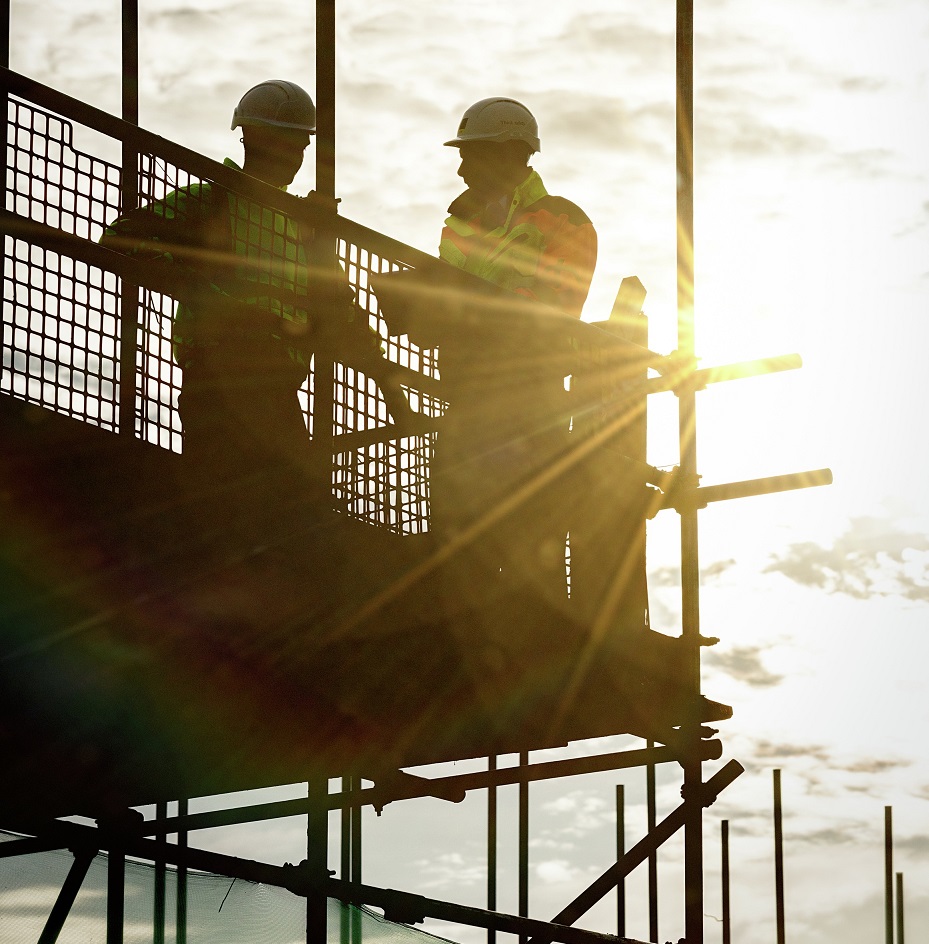Purchasing managers report loss of construction momentum in August
Activity in the UK construction sector last month lost the momentum it had gained in July, according to the latest report from purchasing managers who cited economic uncertainty and a wait-and-see approach among clients.

The IHS Markit/CIPS UK Construction Total Activity Index dipped to 54.6 in August after strengthening to a 57-month high of 58.1 in July and 55.3 in June. It was just 8.2 in April.
Housebuilding, although still robust, saw reduced expansion in August while there was also a slowdown in growth in commercial activity. Civil engineering activity contracted.
New business rose for a third successive month in August, but at a reduced rate. There were reports of new business being limited by uncertainty among customers. Despite this, confidence in the sector rose.
Employment in the construction sector fell again in August, as it had done in both the services and manufacturing sectors, according to the purchasing managers. This may prompt the Chancellor to consider further steps to support the labour market in the Autumn Budget.
The softer August construction purchasing managers’ survey contrasts with improved surveys for services (at a 64-month high) and manufacturing (at a 30-month high).
Tim Moore, economics director at IHS Markit, which compiles the survey: “The latest PMI data signalled a setback for the UK construction sector as the speed of recovery lost momentum for the first time since the reopening phase began in May.
“Another month of widespread job shedding highlighted the ongoing difficulties faced by UK construction companies, with order books often depleted due to a slump in demand from sectors of the economy that have experienced the greatest impact from the pandemic.
“More positively for the employment outlook, business expectations climbed to a six-month high in August as construction firms turned their hopes towards a boost from major infrastructure work and reorienting their sales focus on new areas of growth in the coming 12 months.”
Duncan Brock, group director at the Chartered Institute of Procurement & Supply, added: “The momentum in the sector’s recovery hit a bump in the road in August with a sudden slowdown in output growth and tender opportunities, while employment trends remained the most fragile in a decade.
“This stalled progress was not a surprise given the warning signs last month that any hard-won progress could start to fizzle out.
“As new order gains slowed across all sectors, continuing COVID-19 anxiety amongst clients meant many projects still remained on ice.
“Though residential building remained the strongest, it too was showing signs of strain. “In addition, there were ongoing difficulties in supply chains which hampered the sourcing of raw materials.
“Delivery times lengthened in August as a result of stock shortages at suppliers and cost increases were the highest since April 2019.
“Even with all these obstacles, builders were at their most optimistic since the beginning of the year. This glass half full attitude will have to carry companies into the autumn as the UK economy remains delicate and susceptible to more turbulence.”
Responses
Jessica Levy, director of communications of the Federation of Master Builders (FMB)
“The slowdown in growth reported in today’s Construction PMI report points to the need for policies which sustain much-needed jobs and activity, and give consumers confidence to invest. The Green Homes Grants scheme has the potential to do this, but just weeks away from its roll out, the government needs to step up support for builders to gain recognition for their competence and high quality workmanship and register for the scheme.
“Rightly, the focus is on competency, but the mechanisms proposed are complex, especially within the Government’s ambitious timescales. The time and costs involved in accreditation risk putting off quality builders who otherwise are committed to doing their bit to achieve Net Zero.
“We know that the Green Homes Grants will be put under the microscope before more public investment in energy efficiency is brought forward. The FMB is campaigning for the Government to commit to a long-term, ambitious plan for green homes at the Budget, that will lead to sustainable jobs and organic growth in the energy efficiency market. This will increase business confidence to step up and make the Green Homes Grants a success.”
David Pratt, managing director of Vision Architects
“The construction sector is a curious mishmash right now. Within residential housebuilding, some developers remain active while others are rushing for the door, even selling land to improve cashflow for existing developments.
“With unemployment likely to skyrocket, and major structural changes occurring across both the retail and commercial sectors due to Covid-19, construction is in for a bumpy ride in the short to medium term.
“The entire economy is in such a state of flux that confidence within construction is changing almost by the day.”
Gareth Belsham, director of the national property consultancy and surveyors Naismiths
“Quick quick slow – the construction sector is dancing a faltering foxtrot as new orders wobble but confidence steps up.
“Two months of meteoric jumps in output were always going to be a hard act to follow, so few people will be surprised that overall momentum has eased back from the near five-year high seen in July.
“While the decline in new orders is a serious concern, this latest PMI data still paints a picture of an industry that has dusted itself off and got back to work with gusto.
“The trouble is that the caffeine shot of energy that contractors received when sites reopened in May is wearing off. As backed-up projects are completed, there aren’t enough new orders to replace them – and this prompted many building firms to shed staff in August.
“Yet for all that, sentiment is strong. On the day that formal construction work begins on HS2 – Europe’s biggest infrastructure project – it’s striking that the PMI survey found businesses are bullish about the impact this huge programme will have on the industry as a whole. Business expectations soared to a six-month high in August.
“The boom in house prices has given housebuilders their mojo back too – with residential construction easily the strongest of the subsectors tracked by the PMI.
“So far the recovery has been impressively v-shaped, but the industry is now at a critical juncture. If new orders don’t pick up soon, there’s a danger the ‘v’ could turn into a ‘w’.”
Mark Robinson, chief executive of public sector procurement specialist Scape Group
“The construction industry took another positive step along the road to recovery, however, with the country in deep recession and with the prospect of a spike in unemployment as furlough support measures begin to ease, the long-term picture remains uncertain.
“With private capital likely to be less forthcoming in the coming months, the public sector must continue to be the driving force behind the sector’s output. Progressive local authorities are rightly seeing urban regeneration as a central pillar of their recovery plans to not only support short term job creation in construction, but to shape new sustainable places and opportunities that will inject new life into local economies and communities.
“To do so, it’s essential that the next round of planned ‘build, build, build’ projects are revealed and progressed quickly.
“With that in mind, government must now look to identify the right partners that are fully equipped to accelerate the design and build process without compromising on quality or the requirements of the wellbeing economy.”
Kate Kirby, partner in the construction & infrastructure practice at DWF
“Today’s figures pointed to a setback for the recovery in UK construction output, with growth easing from the near five-year high seen during July. However, housebuilding has registered the strongest rebound since the stoppages of work on site in late-March due to COVID-19. One of the biggest issues facing the sector, which has largely remained active during the pandemic, is the shortage of access to materials and appropriate subcontractors.
“Looking ahead, the sector should prepare for a few difficulties as furlough schemes come to an end.
“In a post–pandemic world, there will still be a requirement for more homes, urban regeneration, improved infrastructure, improved offices, retail space and more distribution facilities. We all know from past downturns that a robust construction sector will emerge but how and when, we just do not know.”























